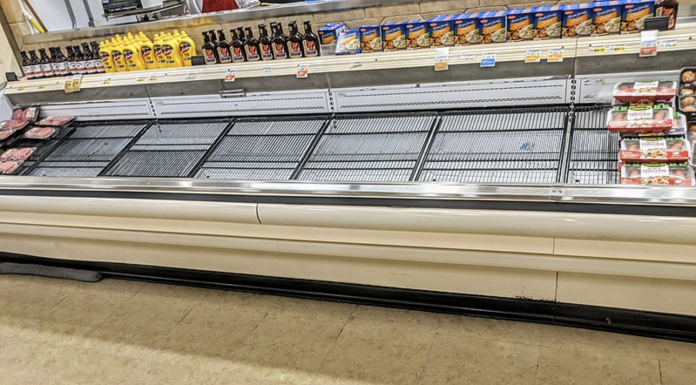
“Livestock and poultry production fell off the cliff immediately after the April 1 start of the third quarter as COVID-19 threatened to take out the meat industry.”
By Dan Flynn on May 15, 2020
Food Safety News – When USDA’s second quarter of the fiscal year ended on March 31, livestock slaughter was off only 2.2 percent from the first quarter and poultry production was actually up some.
Those measures of inspection activity by the Food Safety and Inspection Service (FSIS) are for carcasses inspected during the second quarter, running from Jan. 1 to March 31. The FSIS observes the federal fiscal year that begins on Oct. 1.
Livestock and poultry production fell off the cliff immediately after the April 1 start of the third quarter as COVID-19 threatened to take out the meat industry by sickening many workers.
Rolling plant closures and production cuts brought on by too many employees coming down with coronavirus illnesses after April 1 won’t show up in the numbers until next quarter.
During the second quarter, FSIS inspection personnel applied their USDA inspected stamps to 42,902,803 livestock carcasses. That was down just a bit from the first-quarter production of 43,871, 819.
At the same time, they condemned 67,790 head during the second quarter, which compares to 69,433 during the first.
Poultry production hit 2,453,061,148 birds during the second quarter, up from 2,419,203,614 during the first.
FSIS inspectors condemned 4,615,588 chickens and turkeys during the three-month period ending March 31.
That was up from 3,942,303 during the first quarter.
The FSIS inspection personnel again documented more than 1.7 million verification procedures, finding 25,524 documented instances of noncompliance.
The FSIS Quarterly Enforcement Report for the period counts that as a 98.6 percent compliance rate by the meat industry with regulatory requirements.
Quick question for Headline Health readers: Would you fly in an airplane where 98.6 percent of the parts were in compliance with regulatory requirements?
Findings of noncompliance can be appealed. During the second quarter, 703 appeals were filed by the industry.
Among those, 191 appeals were granted, 233 were denied, and 104 resulted in a modified decision. There were 123 appeals pending as the quarter closed.
Imported meat and poultry subjected to “routine reinspection” during the second quarter were almost unchanged, at 1.049 million pounds compared to 1.011 million pounds during the first quarter. Imports increased by less than 4 percent.
Imported eggs, accepted after routine reinspection, were up by about 22 percent at 2.2 million pounds, up from 1.7 million pounds that were cleared during the first quarter.
Detentions of meat, poultry, and eggs by the FSIS Office of Investigations, Enforcement and Audits (OIEA) hit 354,531 pounds during the second period, up from 234,165 in the first. Most of that 34 percent increase came in the Southeast region where 171,628 pounds were detained.
The FSIS logged administrative actions against 17 of the nation’s largest meat and poultry plants. Five of those actions involved suspensions. Two of the administrative actions are unusual.
Augusta, GA-based FPL Foods, and Elizabeth, NJ-based Preferred Freezer of Elizabeth LLC both “violated a regulatory control action,” the Quarterly Enforcement Report says. The New Jersey firm was suspended for a day.
On Jan.7 the U.S. District Court for the Southern District of New York approved a Consent Decree involving Chung Shing Meats Inc., ordering compliance with federal meat and poultry acts.
The company was enjoined from further violations and the order contains enforcement provisions.
On Jan. 30 the FSIS agreed to a Consent Order with Christopher Leach, owner of the Beautiful Pig in Longview, WA. FSIS earlier had refused to provide Leach with inspection services.
Leach previously was convicted of two federal misdemeanors for the sale and transportation of meat that was not federally inspected. A 5-year Consent Order promises Leach will conduct his business practices in an ethical manner and follow all food safety requirements.
On Feb. 21 FSIS filed an administrative complaint against Sandhills Beef Company in Mullen, NE, for its failure to be in compliance with either HACCP or SSOP requirements.
The FSIS also filed a civil complaint and obtained a Consent Decree for Worcester, MA-based Makola Market.
The order contains enforcement provisions including civil penalties for non-compliance to bring the business into compliance with the Federal Meat Inspection Act and all FSIS regulations.
The U.S. District Court for Massachusetts signed off on the Consent Decree.
(To sign up for a free subscription to Food Safety News, click here.)
ALSO ON HEADLINE HEALTH TODAY:
Santana Family Mourns Guitarist’s Passing



